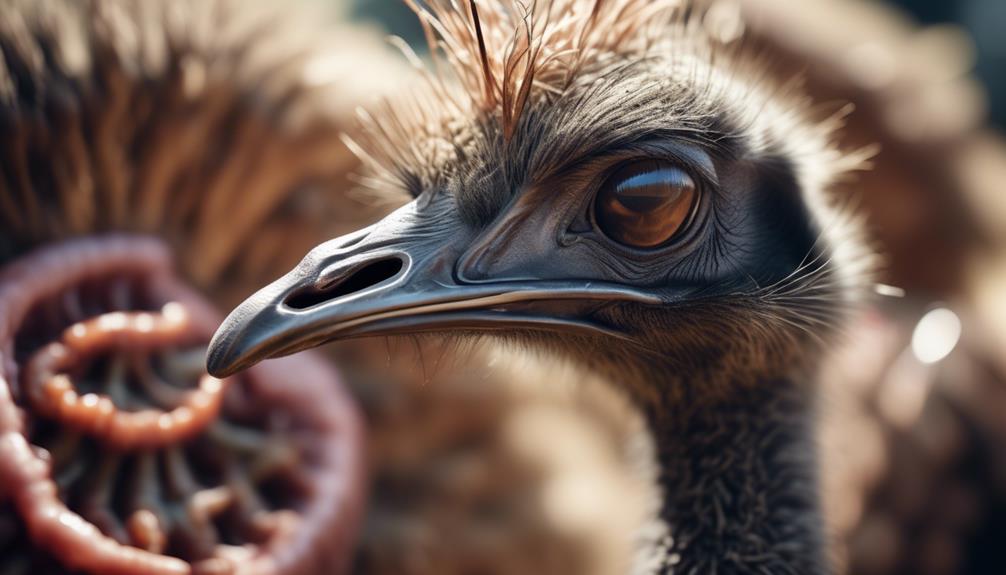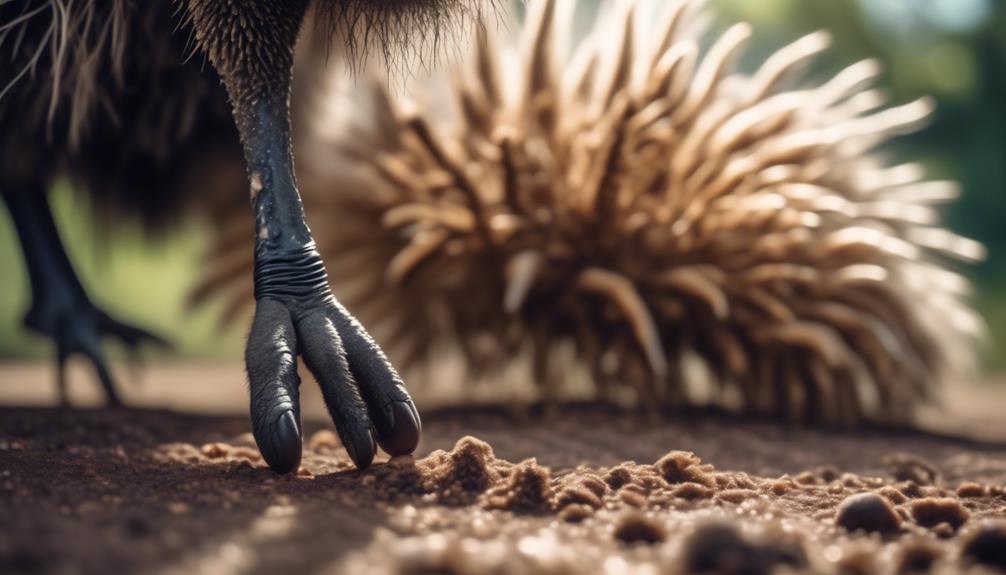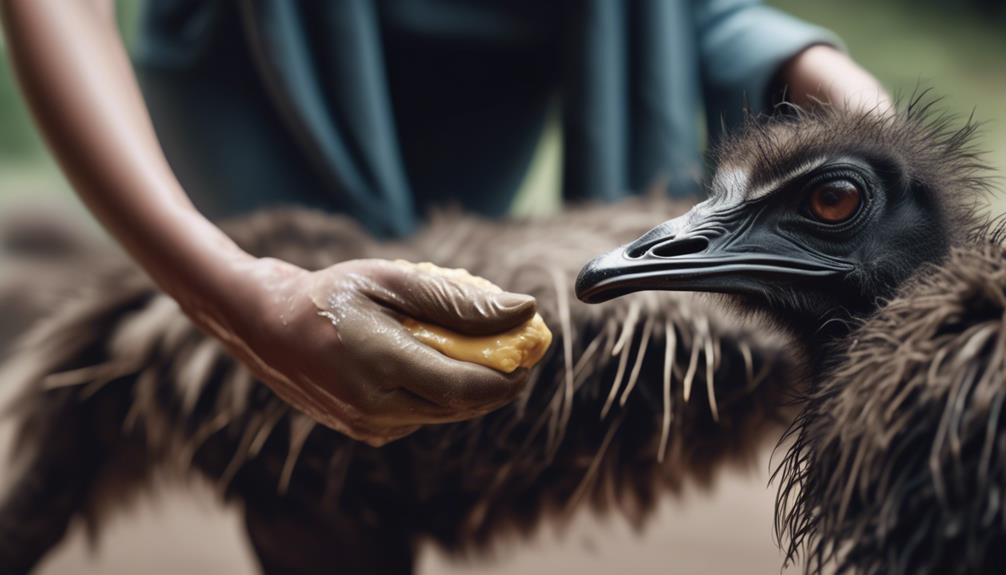
When it comes to the well-being of your emus, it's important to be aware of the various health issues they may encounter. From respiratory problems to skin conditions, digestive issues to joint and muscle disorders, there are a range of ailments that can affect these fascinating creatures.
And while it's always best to consult a veterinarian for professional guidance, this discussion aims to provide you with some insights into the common health concerns of emus and how to effectively treat them.
So, whether you're a seasoned emu owner or simply curious about their care, read on to discover valuable information that will help you ensure the health and happiness of your emus.
Respiratory Problems

Respiratory problems in emus can range from mild to severe, often requiring prompt and targeted treatment to ensure the bird's well-being. One common respiratory issue in emus is bronchitis. Bronchitis is characterized by inflammation of the bronchial tubes, which can lead to coughing, wheezing, and difficulty breathing. If your emu is displaying these symptoms, it's crucial to seek veterinary care immediately.
The treatment for bronchitis in emus involves a combination of medications and supportive care. Your veterinarian may prescribe antibiotics to treat any bacterial infection present in the respiratory tract. Additionally, bronchodilators and anti-inflammatory drugs may be administered to reduce inflammation and improve airway function. It's important to administer medications as directed by your veterinarian and provide a clean and well-ventilated environment for your emu to aid in their recovery.
Prevention of pneumonia is another critical aspect of respiratory health in emus. Pneumonia is a serious respiratory infection that can be life-threatening if not treated promptly. To prevent pneumonia in emus, it's essential to maintain proper hygiene and cleanliness in their living environment. Regularly clean and disinfect their housing, provide good ventilation, and ensure that emus aren't exposed to drafts or extreme temperature changes. Additionally, practicing good biosecurity measures, such as limiting contact with other birds, can help reduce the risk of respiratory infections.
Skin Conditions
Emus, like any other animals, can also experience various skin conditions that require proper identification and treatment to maintain their overall health and well-being. Just like humans, emus can suffer from itchy skin and allergic reactions, which can be uncomfortable and distressing for them. It is crucial to recognize and address these issues promptly to prevent further complications.
| Skin Condition | Symptoms | Treatment |
|---|---|---|
| Dermatitis | Redness, swelling, and itching of the skin | Topical creams or ointments, antihistamines |
| Feather Mites | Feather loss, dry and flaky skin | Insecticide application, improved hygiene |
| Fungal Infections | Hair loss, scaly patches | Antifungal medications, environmental sanitation |
| Tick Infestations | Tick presence, skin irritation | Tick removal, use of tick prevention products |
| Sunburn | Redness, pain, and peeling of the skin | Providing shade, applying emollients, avoiding direct sunlight |
If you notice any of these skin conditions in your emu, it is essential to consult a veterinarian for a proper diagnosis and treatment plan. They will be able to recommend specific medications and provide guidance on how to care for your emu's skin. Additionally, taking preventative measures such as maintaining proper hygiene, providing a clean environment, and protecting your emu from excessive sun exposure can help minimize the risk of skin problems. Remember, addressing skin conditions promptly ensures the comfort and well-being of your emu.
Digestive Issues

If your emu is experiencing digestive issues, it's crucial to identify and address them promptly to ensure their overall health and well-being. The digestive system of an emu is complex and delicate, requiring special attention and care. Here are some important points to consider when diagnosing and treating digestive issues in emus:
- Understand the Emu Digestive System: Emus have a unique digestive system that consists of a large crop, an enlarged muscular gizzard, and a long small intestine. This specialized system is adapted for their herbivorous diet and efficient digestion of plant materials.
- Recognize the Symptoms: Digestive issues in emus can manifest as decreased appetite, weight loss, diarrhea, or abnormal droppings. It's important to closely monitor their eating habits and observe any changes in their droppings to identify potential digestive problems.
- Consult a Veterinarian: If you suspect your emu is experiencing digestive issues, it's essential to seek professional veterinary help. A veterinarian with expertise in avian medicine can conduct a thorough examination, perform diagnostic tests, and provide appropriate treatment options based on the specific issue.
Joint and Muscle Disorders
After addressing the digestive issues in emus, it's crucial to now focus on the intricate realm of joint and muscle disorders in these unique birds. Emus, like any other animals, can suffer from various joint and muscle ailments that can affect their overall well-being.
One common disorder that emus can experience is arthritis, which is the inflammation of the joints. Arthritis management is essential in order to alleviate pain and discomfort in affected emus. This can be achieved through a combination of medication, physical therapy, and lifestyle modifications.
Physical therapy plays a vital role in the treatment of muscle disorders in emus. It involves a range of techniques such as massage, stretching exercises, and hydrotherapy to improve muscle strength and flexibility. By incorporating physical therapy into their treatment plan, emus can experience reduced pain, improved mobility, and enhanced quality of life.
It's important to consult with a veterinarian who specializes in avian medicine to develop an individualized treatment plan for emus with joint and muscle disorders. With proper care and management, emus can lead healthy and active lives, free from the limitations of joint and muscle ailments.
Parasitic Infections

Parasitic infections pose a significant threat to the health and well-being of emus, requiring prompt and effective treatment to minimize their impact. These infections are caused by various parasites, including worms and mites, which can affect the digestive system, skin, and overall vitality of the emu.
To ensure the well-being of your emus, it's crucial to implement proper parasitic prevention measures. Here are three key steps to take:
- Regular deworming: Emus should be routinely dewormed to prevent infestations. Consult with a veterinarian to determine the best deworming schedule for your emus, as it may vary based on their age, living conditions, and exposure to other animals.
- Hygiene practices: Maintaining clean and sanitary living conditions is essential in preventing parasitic infections. Regularly clean and disinfect their living areas, including bedding and water sources, to reduce the risk of infestation.
- Natural remedies for parasites: In addition to conventional treatment methods, there are natural remedies that can help prevent or manage parasitic infections. These include incorporating garlic or pumpkin seeds into their diet, as these ingredients are believed to have anti-parasitic properties.
Eye and Ear Disorders
Emus are susceptible to various eye and ear disorders that can significantly impact their overall health and well-being. It's important to understand the prevention measures and treatment options available to ensure the best care for these magnificent birds.
Eye disorders in emus can range from mild irritations to more serious conditions such as conjunctivitis or uveitis. Prevention measures include maintaining a clean and well-ventilated environment to reduce the risk of infections. Regular inspection of the eyes for any signs of redness, discharge, or cloudiness is essential for early detection. If an eye disorder is suspected, it's crucial to consult a veterinarian for an accurate diagnosis and appropriate treatment options. These may include topical antibiotics, anti-inflammatory medications, or other specialized therapies.
Ear disorders in emus can also cause discomfort and affect their overall well-being. Some common ear problems include ear mites, ear infections, or foreign objects lodged in the ear canal. Prevention measures include regular cleaning of the ears to remove excess wax and debris. If an ear disorder is suspected, it's important to seek veterinary assistance for a proper diagnosis and treatment options. This may involve ear drops, antibiotics, or other necessary interventions to alleviate the issue.
Nutritional Deficiencies

To ensure optimal health and well-being for your emus, it's crucial to address and prevent nutritional deficiencies through a balanced and nutrient-rich diet. Emus, like any other living beings, require a variety of essential nutrients to thrive. By understanding the common nutritional deficiencies that emus can experience, you can take proactive measures to prevent malnutrition and provide the necessary dietary supplements for their overall health.
Here are three key factors to consider when it comes to preventing malnutrition in emus:
- Protein: Emus require a diet rich in protein to support muscle development and growth. Incorporate high-quality protein sources such as insects, fish, and legumes into their diet to ensure they receive an adequate amount of this essential nutrient.
- Vitamins and minerals: Provide emus with a balanced mix of fruits, vegetables, and leafy greens to ensure they receive the necessary vitamins and minerals. Key nutrients to focus on include vitamin A, vitamin E, calcium, and phosphorus.
- Omega-3 fatty acids: Emus need a good source of omega-3 fatty acids for their overall health. Including foods like flaxseeds or fish oil in their diet can help fulfill this requirement.
Reproductive Health Concerns
Reproductive health concerns in emus can arise due to various factors, including hormonal imbalances and genetic predispositions. These issues can lead to fertility challenges and reproductive system infections in emus, affecting their ability to breed and reproduce successfully.
Fertility challenges are common in emus and can be caused by factors such as age, stress, and inadequate nutrition. Emus are known for their high fertility rates, but if they experience hormonal imbalances or nutritional deficiencies, their reproductive capabilities can be compromised. It's important to provide emus with a balanced diet that meets their nutritional needs to ensure optimal reproductive health.
Reproductive system infections can also pose a threat to emus' reproductive health. These infections can be caused by bacteria, viruses, or parasites, and can lead to inflammation, reduced fertility, and even infertility. Regular veterinary check-ups and preventive measures such as proper hygiene and vaccination can help prevent and treat reproductive system infections in emus.
If you suspect that your emus are experiencing fertility challenges or reproductive system infections, it's crucial to consult a veterinarian who specializes in avian reproductive health. They'll be able to diagnose the issue, provide appropriate treatment, and offer guidance on how to improve your emus' reproductive health. Remember, addressing these concerns promptly is essential for the long-term breeding success of your emus.
Behavioral Disorders

Behavioral disorders in emus can manifest as abnormal or disruptive patterns of behavior that can impact their overall well-being and functioning. It's crucial to address these issues promptly to ensure the emus' physical and mental health.
Here are three key strategies for managing behavioral disorders in emus:
- Emu aggression management: Aggression is a common behavioral problem in emus, which can result in injuries to themselves or others. To manage emu aggression, it's essential to identify the underlying causes, such as territorial disputes or mating competition. Implementing measures like providing adequate space, separating aggressive individuals, and enriching their environment can help reduce aggressive behavior.
- Emu anxiety treatment: Emus can experience anxiety, leading to behaviors like pacing, feather plucking, or self-harm. To treat emu anxiety, creating a calm and stress-free environment is crucial. This can be achieved by providing hiding spots, ensuring a consistent routine, and offering mental stimulation through foraging activities. In severe cases, consulting with a veterinarian for appropriate medication or behavior modification techniques may be necessary.
- Positive reinforcement training: Training emus using positive reinforcement techniques can help modify unwanted behaviors and promote desired ones. By rewarding desirable behaviors like calmness, cooperation, and socialization, emus can learn to replace problem behaviors with more appropriate ones. Consistency, patience, and gentle handling are key to successful positive reinforcement training.
Immune System Disorders
Emus' overall well-being and functioning can be significantly impacted by immune system disorders, which require prompt attention and appropriate treatment. These disorders encompass a range of conditions, including autoimmune diseases, allergies, and sensitivities.
Autoimmune diseases occur when the immune system mistakenly attacks the body's own cells and tissues. In emus, common autoimmune diseases include lupus, rheumatoid arthritis, and psoriasis. These conditions can lead to inflammation, pain, and discomfort, affecting the emu's ability to move and function properly. Treatment for autoimmune diseases in emus often involves a combination of medication to suppress the immune response and manage symptoms, as well as supportive care to alleviate pain and promote healing.
Emus can also develop allergies and sensitivities to certain substances in their environment. These can manifest as skin rashes, itching, respiratory distress, or digestive issues. Identifying the specific allergen or irritant is crucial in managing these conditions. Allergies and sensitivities in emus can be treated with antihistamines, corticosteroids, or immunotherapy, depending on the severity and nature of the reaction.
Wound Care and Injuries

Wound care and injuries are crucial aspects of maintaining the overall health and well-being of emus, requiring careful attention and proper treatment. As emus are susceptible to cuts and scrapes, it's important to address these injuries promptly to prevent infections and ensure a speedy recovery.
Here are three essential steps to effectively treat wounds and prevent complications:
- Clean the wound: Begin by gently washing the affected area with a mild antiseptic solution. This will help remove any dirt or debris that may be present and reduce the risk of infection. Take care to avoid using harsh chemicals or alcohol-based solutions, as they can further irritate the wound.
- Apply an antibacterial ointment: After cleaning the wound, apply a thin layer of an antibacterial ointment to promote healing and prevent bacterial growth. Look for products specifically formulated for avian use to ensure safety and effectiveness.
- Protect the wound: Cover the wound with a sterile dressing or bandage to provide protection and prevent further damage. Change the dressing regularly, keeping the area clean and dry to promote healing.
Frequently Asked Questions
Can Emus Get Allergies?
Yes, emus can get allergies. Symptoms may include itching, sneezing, and respiratory problems. Treatment options may include antihistamines and avoiding allergens. If your emu shows signs of allergies, consult a veterinarian for proper diagnosis and guidance.
How Can I Prevent My Emu From Developing Behavioral Disorders?
To prevent behavioral disorders in your emu, focus on early intervention and emu behavioral training. By addressing any issues promptly and providing consistent training, you can help your emu develop healthy behaviors and prevent future problems.
Are Emus Prone to Developing Autoimmune Disorders?
Emus, like any other living beings, are not immune to developing autoimmune disorders. Potential genetic factors and breeding patterns can contribute to the likelihood of such disorders occurring in emus.
What Should I Do if My Emu Has a Wound That Won't Heal?
If your emu has a wound that won't heal, don't fret! To promote healing in emu wounds, cleanse the area gently with saline solution, apply antibiotic ointment, and cover it with a sterile dressing. Keep a close eye on it for signs of infection.
Can Emus Suffer From Mental Health Issues?
Emus, like any living beings, can experience mental health issues. It's important to be aware of signs such as decreased appetite, lethargy, or unusual behavior. Treatment options include providing a calm environment and seeking professional guidance. Emu mental health awareness is crucial for their well-being.
Conclusion
In conclusion, it's important to address the various health concerns that can affect emus.
By understanding and treating respiratory problems, skin conditions, digestive issues, joint and muscle disorders, parasitic infections, reproductive health concerns, behavioral disorders, immune system disorders, and wound care and injuries, we can ensure the well-being of these remarkable creatures.
By taking a proactive approach and providing them with proper care, we can help our emu friends live their best and healthiest lives.




